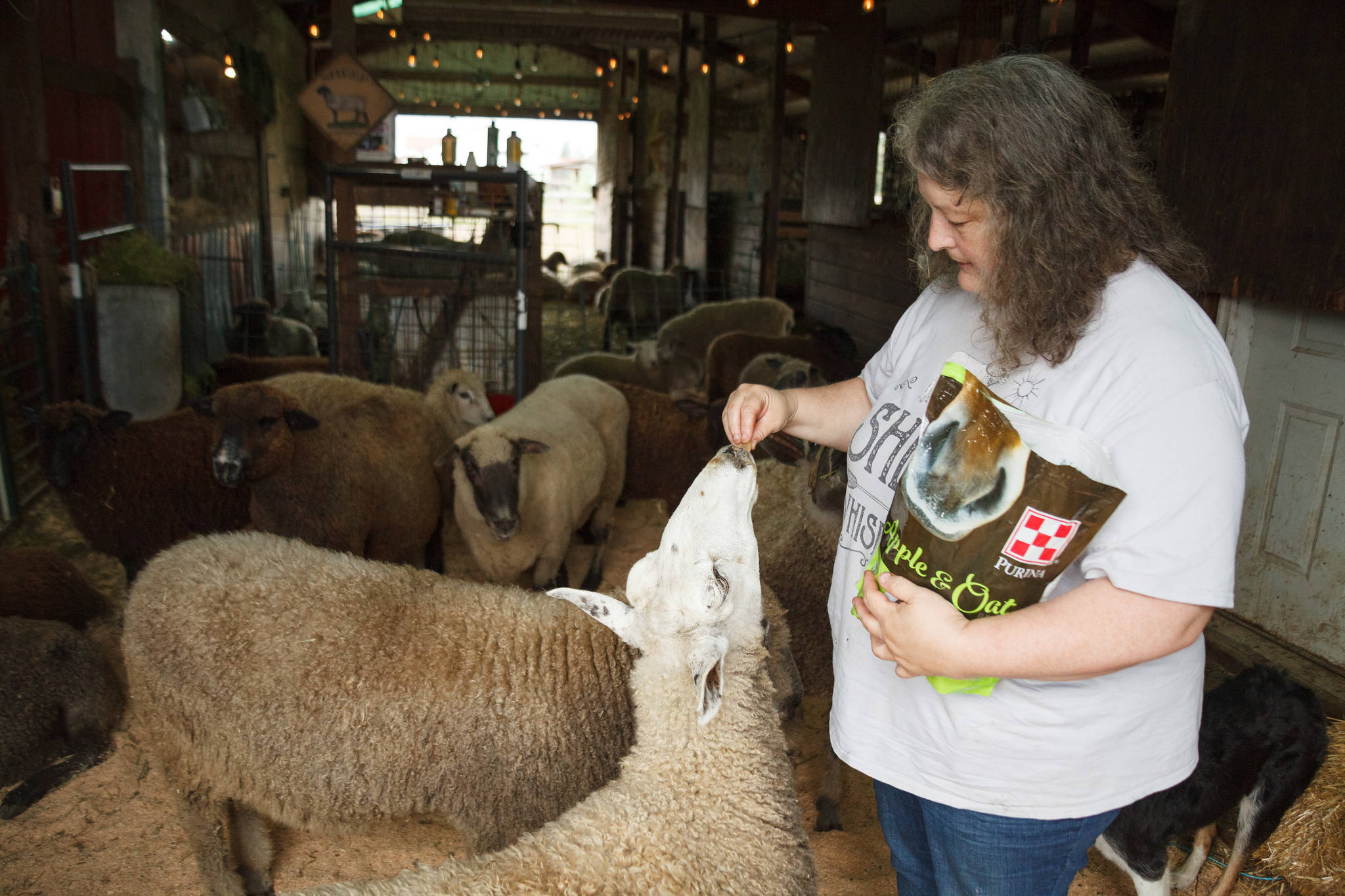Bless Ewe Sheep Company in Enumclaw, owned and operated by Carolynn Bernard, has been hit hard by the pandemic and the effects of climate change — putting her livelihood and the welfare of her sheep in jeopardy.
Droughts caused crop loss in Eastern Washington, which drove up the price of feed, which was only amplified by the pandemic’s disruption of the supply chain, Bernard said.
“I went through a few weeks where I couldn’t even get anything. There was no grain,” Bernard said. “Then when the grain came back, it went from being $13 a bag to $19 a bag, and that hit me hard.”
In addition to this, the heatwaves in Western Washington have killed acres of grass on which the sheep typically graze, meaning Bernard has had to spend more on feed, which has already risen in cost by 20% in some cases.
Bless Ewe Sheep Company has two primary streams of revenue: wool and breeding stock. Bernard said the pandemic has affected both revenue streams.
“Normally I have a whole bunch of people who come on shearing days and I will sell 50% of my fleece off the back of the sheep, but because of the pandemic, nobody’s been coming,” Bernard said. “So I have a backlog and there’s only so long that the wool can be stored without degrading.”
Around 40% of the wool Bless Ewe sold was to three companies across the country in Ohio, Texas and North Carolina. All three went out of business during the pandemic, Bernard said.
A major source of customers for breeding stock is the Washington State Fair in Puyallup, which was closed last year due to the pandemic.
“The one that hit me really hard was that the fair was cancelled, so I couldn’t go and show my stock, which is a big source for my sales,” Bernard said. “I get probably 75% of my sales based on my fair performance.”
Bernard took to GoFundMe in hopes of raising enough money to make it through the winter. Feed is only one of the costs associated with maintaining the farm. Because many of Bernard’s sheep have special needs, Bless Ewe also has to pay for medicine and vet visits. You can donate to the GoFundMe here. So far she’s raised $6,000 of her $15,000 goal.
The mission
Bernard isn’t in it for the money — something made abundantly clear within minutes of visiting the farm. Bless Ewe Sheep Company is a sanctuary as much as it is a working farm. Bernard takes in elderly sheep, sheep that are disabled or sick, or would otherwise be sent to be slaughtered.
The care and compassion Bernard takes in raising her sheep is something rare in the era of factory farms. Bernard has names for each of the more than 100 sheep on the farm. Any sheep she sells always have a home back at Bless Ewe.
“Any sheep I’ve sold in the past, they always have a home here. I’ve taken back 22 since the pandemic started,” Bernard said.
She was able to take care of the special needs sheep with money she made from wool and breeding stock, but looking ahead to the winter, Bernard is worried about making ends meet.
Bernard got into raising sheep in a roundabout way: through training border collies. In 2008, she was training border collies for competition and realized that in order to take the training to the next level, she would need to have some sheep.
After buying a few sheep, she quickly fell in love with the animals and their intelligence, temperament and affection. Bernard shifted her focus from training dogs to raising sheep, and created Bless Ewe.
As a disabled veteran, working with sheep has helped Bernard get through some rough parts of her life.
“I have worked with a lot of veterans in the past and one of the things that these sheep do as prey animals, you have to figure out really quickly how to manage your moods and the energy you’re projecting,” Bernard said. “If you are amped up, if you have the wrong energy, if you have the wrong mindset, they won’t have anything to do with you. Because they’re prey animals, and they’re not taking off, you know you’re safe and that’s the biggest thing for me when I’m around these sheep I don’t have to be on guard.”
Along with revenue, labor is another thing Bless Ewe has struggled with. There’s one part-time employee who helps around the farm when she can, but other than that, it’s just Bernard.
“It’s almost impossible to find labor. I’m single and I do this by myself. I also take care of another farm down in Auburn during the day,” Bernard said. “I pay my employees well. They get $20 an hour and then I eat Top Ramen.”
Check it out
Bernard invites anyone looking for work or volunteer opportunities to reach out to her through Bless Ewe’s Facebook page or her email carolynn@blessewesheepcompany.com.
You can see some of Bless Ewe’s sheep in person during the last week of the Washington State Fair in Puyallup this September.


